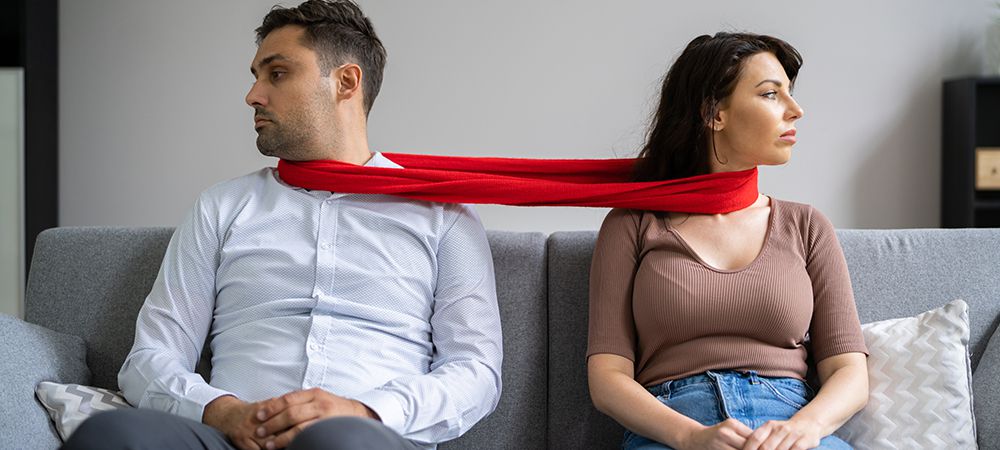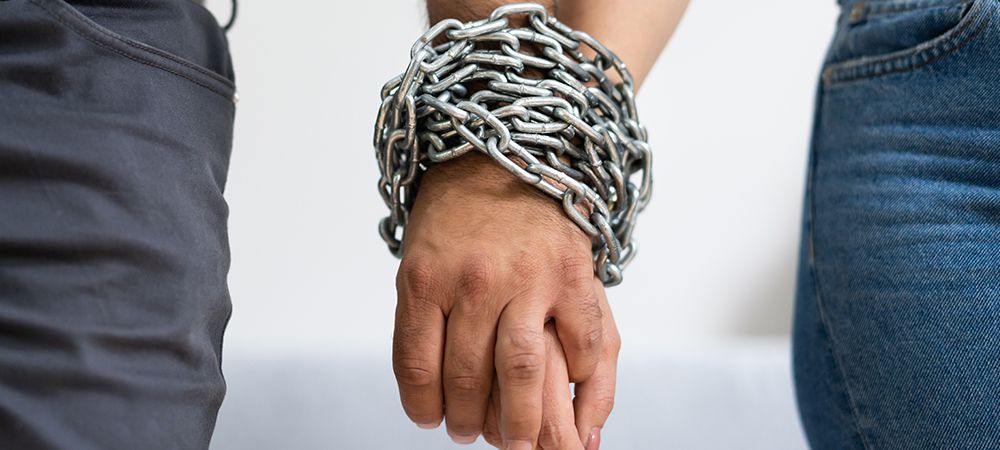Codependency is a word that is thrown around a lot. Let’s explore what it really means.
Does someone you know need approval from others to feel good about themselves? Do they fall apart when someone offers constructive criticism? Maybe they enable other peoples’ addictions, or stay in bad relationships they should probably leave.
If any of these scenarios reminds you of one of your loved ones, that person may be codependent. We know from addiction experts that this condition is as harmful as any mental health disorder. People who are codependent suffer so much and are usually in denial about what is happening to them. In many cases, a loved one with some objectivity may have to step in.
The good news is that codependency is treatable with counselling. Whether you are concerned about another person or yourself, it is essential to get treatment. Luckily, we live in a time where we know so much about how to stop it.
Let’s explore what codependency is, what causes it, and how to overcome it.
What is Codependency?
The most current research defines codependency as a dysfunctional relationship where one person – the codependent – supports or enables another person’s drug or alcohol addiction, gambling addiction, poor mental health, immaturity, irresponsibility, or under-achievement. The codependent relies excessively on other people for validation and a sense of identity. Their behaviours and choices revolve almost entirely around another person. Various psychiatrists label codependency as a disease, just like addiction.
Codependency can manifest in many different ways. For example, it can be the husband who enables his wife’s alcohol addiction by buying her booze, the parent who allows her son’s destructive behaviour to continue at school, the girlfriend who lies to protect her abusive partner, or the overly clingy boyfriend who struggles to be away from his beloved for even the shortest time.
Helping a loved one handle their problems and supporting them no matter the cost makes the codependent feel needed and validated. They interpret dependence as committed love, even in unfulfilling or abusive relationships. Their deeply rooted desire to feel validated tricks them into believing that dysfunctional bonds are healthy and emotionally appropriate.
In reality, as experts point out, nothing erodes self-esteem more quickly than a toxic relationship. Many people remain in dysfunctional marriages because they believe that this is all they deserve. When bad things happen, they simply grit their teeth and tell themselves that they should be grateful for what they have. The idea of separation feels worse than any bad relationship for a codependent.
If someone is suffering from codependency, they should get help as soon as possible. There is strong evidence that treatment can help manage the condition. There are ways for the codependent person to recognize and alter their destructive behaviours.
Understanding Codependency to Stop It
Codependency is a learned behaviour, which means it can be altered. We watch the actions of our parents when we are children. If our mother or father had a problem with boundaries, was always the martyr, could never say “no” to people, and had unhealthy ways to communicate, we most likely learned these behaviours and carried them over into our own relationships.
Children who grow up with emotionally unavailable parents are at risk of being codependent. As adults, they often find themselves in relationships where their partner is emotionally unavailable, yet they stay in the hopes that they can change the person. No matter what happens, they won’t stop hoping that one day things will be good.
The subconscious hope is that the other person will see all the love that is given and be inspired to change. The codependent person believes that if they just hang in there and give their love, understanding, and support, they will finally receive the love that they crave for themselves. This thinking is destructive. It is especially dangerous if our loved one tends to exhibit physically or emotionally abusive behaviour.
As if this isn’t damaging enough, when the codependent person fails to realise what is going on, they may continue to live in a loveless partnership. They have, after all, never learned what a strong, functional relationship looks like. Codependent people do not believe that they are worthy of love, so they settle for less. Often, they find themselves tolerating mental, emotional, physical, and even sexual abuse from their partner.
It is essential to stop that pattern.
Codependency Signs and Symptoms
In psychology, codependency is usually described in terms of one person’s behaviours and attitudes, rather than the relationship as a whole. Someone who is codependent often builds their identity around helping others. They may “depend” on others to validate their self-worth. A codependent person may deny their own desires or emotions to get this approval.
Common signs and symptoms of codependency include:
- Low self-esteem: Codependency may cause feelings of shame and worthlessness. A person may believe they do not deserve happiness. If a person does not value themselves, they may try to get others to value them. The sense of “being needed” can prompt internal gratification, even if the recipient of care does not show gratitude.
- Poor boundaries: Codependent people often feel responsible for the happiness of others. They can have a hard time saying “no” or putting their own needs first. They may hide their true thoughts and feelings to avoid upsetting anyone.
- A need to “save” others: Codependent people may feel it is their duty to protect their loved ones from all harm. If a loved one does something wrong, they will likely try to fix the situation on the loved one’s behalf. Such behaviour can prevent others from becoming independent or learning from their mistakes. It may also enable abuse or addiction to persist unchallenged.
- Self-denial: A codependent person often prioritises other people’s well-being over their own. They may deny their own needs for rest, emotional support, and self-care. They may feel guilt or anxiety when asserting their own desires. Codependent people can feel uneasy when others offer support.
- Perfectionism: Codependent people often project an image of self-reliance and competence. It is common for people to take on more responsibilities than they can handle. When they make an error or receive criticism, they may grow insecure.
- Control issues: A codependent person may link their own self-worth to someone else’s well-being. If a loved one fails, a codependent person may feel as if it is them who failed. Their attempts to make other people’s lives better may start to manifest as controlling or possessive behaviour.
Not every codependent person will show all these symptoms. But if a person shows several of these traits, they may be codependent and in need of professional treatment.
How Parentification May Lead To Codependency
Codependency is often rooted in childhood. Often, a child grows up in a home where their emotions are ignored or punished. This emotional neglect can give the child low self-esteem and shame. They may believe their needs are not worth attending to.
Typically, one or more parents are not filling their role as guardians. Their dysfunction could be due to addiction, a mental health diagnosis, major life stressors, or other concerns. The child may need to perform tasks that exceed their developmental ability. For example, if a parent is regularly too drunk to fix dinner, a young child may learn to cook so the family doesn’t go hungry.
Often the line between child and adult becomes blurred. If a parent isn’t filling their role, a child may become a pseudo-parent for their siblings. They might fall into the routine of changing their baby brother’s diapers or helping a school-aged sibling finish their homework. This phenomenon of children acting as parents is known as “parentification”, and it can have long-term detrimental effects on the child.
Sometimes the child is expected to care for their own parent. A parent experiencing domestic violence may turn to the child as a confidante. A parent with narcissism may insist on the child providing them with praise and comfort. These interactions are often called “enmeshment”.
Since children are not fully grown, filling the role of “adult” can take all their energy. A child may be so focused on keeping the household running that they ignore their own needs. They may associate the caregiving role with feelings of stability and control.
For children in these situations, codependent behaviours can be necessary for survival. In adulthood, the behaviours are not as adaptive. In fact, codependency can prevent a person from developing truly stable relationships.
Codependency or Caring?
Codependency describes helping or caring about someone to an unhealthy degree. A codependent person defines themself by the way they unfalteringly help their loved one. It gives their life purpose and meaning. Their existence and self-worth are consumed by their caregiving role.
A person in a healthy relationship cares deeply about their loved one, but not to an unhealthy degree. Crucially, they do not define themself by the care they provide. If their loved one exhibits negative or harmful behaviours, they help without enabling. They care and nurture but doing so is not their reason for existing. They do not rely on validation from other people to feel happy. Individuals in healthy relationships are fine when they are by themselves.
The Three Stages of Codependency
Experts have defined three stages of codependency as follows:
Early Stage
Codependents become increasingly and unhealthily obsessed with someone. Problematic behaviour is denied or rationalised. Lost in their desire to please, the codependent person may give up their own friends and activities.
Middle Stage
Anxiety, guilt, and self-blame increase. Self-esteem plummets as the codependent gives more and more into the relationship, but does not receive much back. Frustration, disappointment, and resentment grows. The codependent may attempt to change their loved one by nagging, blaming, or manipulating them. They may lie about their loved one’s behaviour to family and friends. The loved one is at increasing risk of engaging in harmful addictive behaviours like substance abuse, excessive consumption of alcohol, gambling, or unhealthy eating habits like excessive dieting or binge eating. Despite all this, the codependent’s obsessive, dependent, compliant behaviours also increase.
Late Stage
The symptoms of codependency affect physical and mental health. Stress-related disorders like insomnia, sciatica, headaches, muscle pain, digestive problems, eating disorders, and heart disease may emerge. If addiction is present, it worsens. Self-esteem hits rock-bottom and self-care is no longer important. The codependent feels hopeless, depressed, and angry, trapped in a cloud of desperate despair. After this, it is rock bottom. The codependent person and their loved one need help urgently.
Codependency in the Home
Dysfunctional families are a cultural norm in the modern world. Such families may appear perfectly fine from the outside, but closed doors hide addiction, abuse, illness, trauma, and manipulation. Dysfunctionality in the home breeds codependence.
Parenting requires huge amounts of self-sacrifice and high prioritisation of a child’s needs. Unfortunately, a parent can be codependent on their children if their caring or personal sacrifice is unhealthy or destructive. Children of codependent parents may feel that they are forced to ignore or compromise their own feelings. In this way they may learn to be codependent themselves.
Children of codependent parents may be forced to endure harm and abuse from the caregiver, despite the child’s best efforts to protect themselves. This creates a toxic environment in the home, harming the child’s psychological health.
The issues do not always evaporate after the child enters adulthood and leaves the family home. Codependent parents may rely on adult children in unhealthy ways, making them feel trapped, responsible for their wellbeing, and guilty for not being there enough.
If codependency is an issue in your household, you and your family will benefit from professional intervention. Codependency can be treated effectively with counselling.
Codependency, Addiction and Mental Health
Codependency and addiction are often closely linked. Many addicts feel lonely and unloved because they find it difficult to maintain relationships. They engage in risky behaviours, struggle with work, spend a lot of money fuelling their addiction, and frequently need constant emotional support.
A codependent partner will help an addict deal with work, money, and behavioural problems, offer unlimited emotional support, and enable the addiction. It could be a romantic partner, a friend, or a family member. The codependent may engage in substance abuse with the addict, too. It is also possible for both partners to exhibit codependent behaviours, but usually one person will be addicted and the other will support and enable them.
Codependent/addict relationships are breeding grounds for mental health issues such as depression and anxiety. Some individuals even suffer from panic attacks because their distress is felt so deeply.
If a person with an addiction seeks treatment at a drug and alcohol rehab centre, codependent partners may be able to get support as well. This depends on whether the treatment centre has the additional resources necessary to treat codependency. Private, group, and couples therapy is frequently used as a tool to diagnose and treat the addiction and the codependency simultaneously, but this depends entirely on the needs of each person.
Recovery for addict/codependent couples usually involves abstinence, awareness that addiction and codependency problems exist, acceptance of the problems and the work required to move forward, and finally, behavioural changes. Such changes may include more effective communication, the cessation of behaviour that enables the addicted person, and efforts to support each other in a healthy, loving way.
Breaking the Cycle
If you are codependent, it is essential to seek therapy. Symptoms are reversible with treatment. A professional psychologist will help you identify and talk about the thoughts, feelings, and behaviours you find concerning. The exact treatment required is unique to each individual, but may involve private therapy, group counselling, couple’s therapy and family counselling.
Therapy and medication may be considered alongside codependency treatment if you are struggling with other psychological disorders at the same time, like depression, anxiety, or childhood trauma. In therapy, you will shift focus from other people to yourself. You will rebuild your personal identity, grow your self-esteem, and assert ownership over your feelings, desires, and needs.
A counsellor will help you objectively examine the potential benefits and negative consequences of rejecting codependent relationships. You will learn how to form healthy relationships, establish and maintain reasonable boundaries, and stop enabling dysfunctional behaviours in loved ones.
Eventually, your happiness will not depend on anyone but yourself. You will be fully capable of both independence for yourself and intimacy with a partner. You will have your own interests and goals and the creative energy to pursue them.
When you overcome codependency, your self-esteem will soar. There is an empowered, confident version of yourself buried underneath your anxiety and need for external validation. With counselling, you will learn how to recognise destructive behaviours in your loved ones and how to deal with them in a healthy, effective, non-enabling way. You will also gain the strength to walk away from harmful, unfulfilling, or abusive relationships.
Healing from Codependency
What is great is that codependency is a learned behaviour, which means it can be unlearned. If you love the individual in your life, and want to keep the relationship, you need to heal yourself first and foremost. This includes all interactions with others as well.
Some healthy steps to healing your relationships from codependency include the following:
- Start being honest with yourself and your loved ones. Doing things that we do not want to do not only wastes our time and energy, but it also brings on resentments. Saying things that we do not mean only hurts us, because we then are living a lie. Be honest in your communication and in expressing your needs and desires.
- Stop negative thinking. Catch yourself when you begin to think negatively. If you begin to think that you deserve to be treated badly, stop yourself and change your thoughts. Be positive and have higher expectations.
- Don’t take things personally. It takes a lot of work for a codependent person not to take things personally, especially when in an intimate relationship. Accepting the other as they are without trying to fix or change them is the first step.
- Take breaks. There is nothing wrong with taking a break from your loved one, including a spouse. It is healthy to have friendships outside of your partnership. Going out with friends and pursuing our own interests brings us back to our centre and reminds us of who we really are.
- Consider counselling. Counselling can be the key to overcoming codependency. A counsellor serves as an unbiased third party. They can point out codependent tendencies and actions between you and your loved one that you may not be aware of. Feedback can provide a starting point and direction. Change cannot happen if we do not alter our behaviour.
- Rely on peer support. Co-Dependents Anonymous is a 12-step group, similar to Alcoholics Anonymous, that helps people who want to break free from their codependent behaviour patterns.
- Establish boundaries. Those who struggle with codependency often have trouble with boundaries. We do not know where our needs begin or where the other person’s needs end. We often thrive off guilt and feel bad when we do not put the other first.
Self-Care is Not Selfish – Getting Help
As you’re working to break the cycle of codependency, it may seem as if you are being encouraged to behave in a way that is selfish and unfair. This couldn’t be further from the truth.
In a healthy relationship, both people have fully formed identities outside of their time together. They each bring unique attributes to the table—creating a partnership that allows both of them to grow and thrive.
Struggling with codependency may seem overwhelming, but it is manageable with the right treatment plan. Take the first step toward recovery by asking for help.
If you think you may be codependent, you may benefit from the services of a therapist. A mental health professional can determine whether your behaviours resemble codependency. They can also treat any co-occurring mental health issues. In therapy, you can explore the roots of your behaviour and learn to balance your needs with those of others.
At Addiction Rehab Toronto, we recognize that addiction is often part of a bigger picture that includes codependency. We strive for a holistic approach that includes support for loved ones who are impacted. If codependency has featured strongly in your relationship with the addicted person, overcoming it and learning new, healthier behaviour patterns will be an important part of recovery.








